Responsible Travel in West Africa
For Those Who Seek Raw Adventure Writ Large
By Jason Motlagh
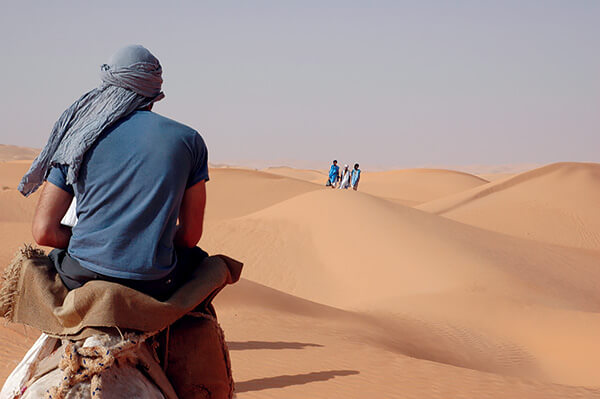 |
The author crosses paths with Saharan nomads during a camel trek to an oasis encampment east of Chinguetti, Mauritania.
Photo Vincent DeLeon. |
The first-time traveler to West Africa quickly learns what a mockery the region makes of maps. I was told the Dakar-Bamako railway took roughly 35 hours each way to cover the 650 miles that separates the two capitals. This
amounted to just one inch of map space in my guidebook. Some months later, I would traverse Russia, at nearly 5,800 miles the world’s longest country east to west, in less time.
State-of-the-art transportation infrastructure is not what draws people to West Africa. Instead, they seek raw adventure writ large: sand-swept Saharan caravan outposts, virgin jungles, sleepy fishing villages, combustible
markets, and heady music that resonates the diverse vitality of countless tribal and ethnic groups. Against the backdrop of state failure and poverty, Africans have learned to improvise, relying on family and friends to move forward yet always
ready to welcome outsiders.
The unfortunate stigma of instability that has prevented many Westerners from experiencing the region’s cultural and natural riches has allowed certain myths to persist; worse still, vital revenues generated from tourism
have not been injected into fledgling economies where they might actually reach those who need them most. Today this means intrepid travelers can have the rare experience of the outsider without being alone, adrift on surging currents of humanity
that seize the senses and open the mind. For better or worse, there is never a dull moment.
With this prospect must come a sense of responsibility. In real terms, the typical West African is about 100 times poorer than the typical Westerner. Niger, ranked dead last worldwide on the latest UNDP
Human Development Index, is joined by Mali, Chad, and Burkina Faso as countries where the average person earns less than $250 a year. Life expectancy remains about 50 years old throughout most of the region. Just as Africa’s woes
cannot be appraised independent of the international community, so too must travelers grasp how the very way they travel affects natives and their environment.
After many fruitless top-down developmental projects, the consensus is now that real economic change and a halt to environmental degradation will be a gradual process largely driven by a bottom-up approach that champions
self-empowerment. Simply by showing up, conscientious independent backpackers can have a meaningful impact on local economies that in the aggregate can lead to broad-based improvements. If villagers receive some degree of tourism revenues they
are incentivized to protect their surroundings while preserving their traditional way of life. This can also stem the tide of urbanization that continues to fuel crime and pollution. One U.K.-based organization, Tourism Concern,
provides a set of guidelines for travelers to minimize their negative impact as they move along.
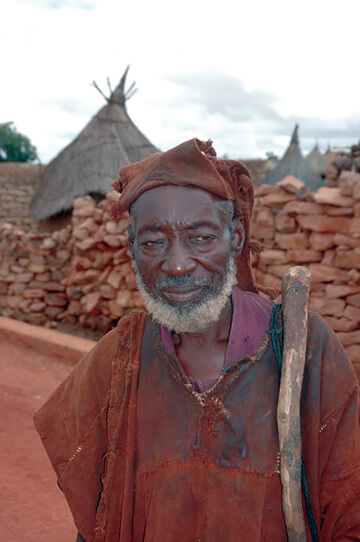 |
Dogon chief greets visitors to his village atop Bandiagara escarpment.
Photo by Jason Motlagh. |
Travel Protocols
First, some protocols for making purchases: Buy locally made souvenirs when possible — whether mud cloth in the ancient city of Djenne, Mali or Tuareg silver jewelry in Agadez, Niger — preferably direct from the
artists, many of whom form collectives to get a fair price for their wares. Be careful not to purchase objects that could be of historical value or are made from endangered species. Bargaining is expected, but bear in mind that a couple of extra
dollars are better off in local hands. If someone provides a service like giving directions or acting as a guide for an afternoon, a tip is in order though not always expected. In some contexts, such as Mali’s Dogon country, village chieftains
encountered during guided treks along the famed escarpment have a penchant for kola, a bitter purple nut valued for its energy-boosting powers. It is common courtesy to offer kola while visiting villages as a form of greeting or in exchange for
taking photos.
Begging can be a near constant hassle in some parts, with the familiar refrain “Donne-moi un cadeau!” (give me a gift). It is assumed, not incorrectly, that foreigners must be wealthy since they choose to explore
the developing world. Sweets or pens are okay, but do not give money to children as it encourages the practice and may be confiscated by manipulative parents. Instead, make a donation to one of the sundry charities working in the region. Better
yet, volunteer and redefine the purpose of your trip. Recommended are CARE International, Medecins Sans Frontiers (Doctors Without Borders), Oxfam International, and Operation Crossroads
Africa. These, and other, organizations are listed at InterAction’s comprehensive website.
The vast spectrum of West Africa’s tribal cultures and religious traditions have at once been a source of strife and splendor. Spread across 17 countries are a kaleidoscope of ethnicities, with names like Fula, Wolof,
Songhai, Ashanti, Mandinka, Hausa, and Yoruba, to name but a few. French is the official language in eight of the countries, English in five, and Portuguese in two, and while most people are at least functional in one of the tongues, there are
literally dozens of dialects that correspond to a multitude of cultural microcosms with distinct rules of etiquette and rituals.
Social Mores
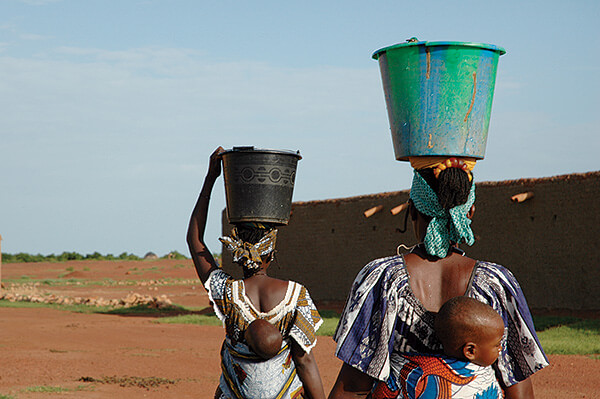 |
Women in Niger bear water and children back to their village, near Tillaberi. The average Nigerien woman has six children in her lifetime.
Photo by Jason Motlagh. |
It is best to read up on social mores before arriving in a new place; otherwise, listen and observe. Here are a few basic rules to follow: Dress modestly, especially in Islamic countries; stick to loose, neutral pants and
long-sleeve shirts when possible; avoid nudity, public anger or displays of affection, criticism of the government or religious beliefs; and take shoes off in mosques provided entry is allowed. “Salaam aleikum” (peace be upon you)
is the standard greeting with Muslims, while handshaking is taken seriously most everywhere. Unlike the West, Africans are highly communal and even the most mundane activity can draw a crowd, so get used to a dearth of personal space in public
and do not be offended by regular physical contact.
Food
Food is not one of the region’s strengths. Although Senegalese cuisine is a cut above that of its neighbors, and widely available outside the country, eating tends to be a cheap and straightforward affair. Roadside
grub can satisfy an empty stomach, though cleanliness is usually a question mark — look for operations doing brisk business. Grilled lamb is a tasty specialty in Mali and Burkina; poulet yassa is standard in Senegal and beyond; river perch
is popular in towns along the Niger; riz sauce and fufu are regional staples. And all can had for less than $2.
Most West Africans eat with their hands from communal bowls, which may take some getting used to if you’re invited to share a meal. Restaurants are a little more expensive and not always more reliable. One consistent
bet is lamb and chicken shawarma sandwiches peddled by Lebanese expats in practically every major city. Bissap, a sweet hibiscus drink, and tamarind juice are popular chilled homemade beverages hawked by children roadside. Delicious in the
heat, you swig at your own risk. Bottled water is also readily available to stave off dehydration; be sure to check the cap has not already been broken.
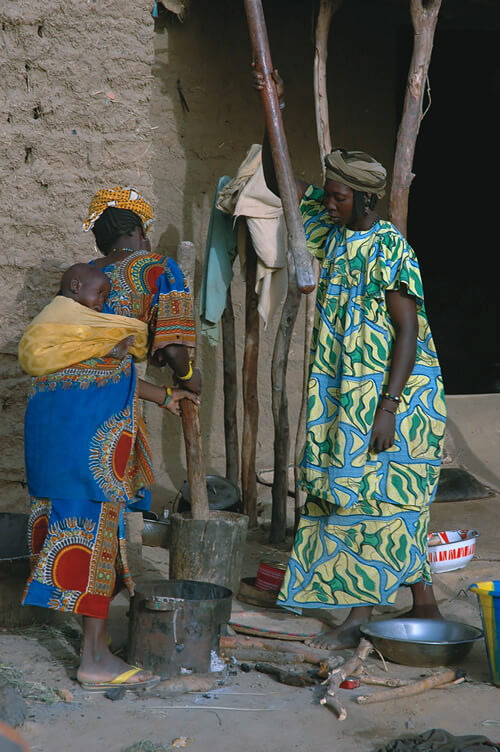 |
Fulani women pound millet near Timbuktu, Mali. The grain has been a long-time staple crop for many Africans since it thrives in hot dry climates.
Photo by Jason Motlagh. |
Accommodations
Compared to other areas in the developing world, accommodations in West Africa can be relatively expensive. But if one is flexible there are plenty of bargains rooms to be had that cater to a shoestringer’s budget
and the local community. One such example is Fondation Charles Dufour in Ouagadougou, the capital of Burkina Faso. The profits from this guesthouse support orphans who are fed, lodged, and educated by the owner. At the AVFP Rest House in Niamey,
Niger, funds go toward outreach programs run by the French non-profit group (see Lonely Planet guide). Similar opportunities to sleep and help abound.
The ascetic traveler can get by on
about $10-$15 a day for food and lodging; for $20-$30, one
can remain in good comfort. It is best to bring U.S. dollars
and euros in low denominations hidden in secure places on one’s
person and baggage, which should be as light and inconspicuous
as possible since theft does occur. Traveler’s checks
and credit cards can be used in major cities but should not
be relied upon in the backcountry. Travel insurance is essential and one is well advised to keep all documents in
the event of a medical emergency since most treatment demands
on-the-spot payment with later reimbursement.
Getting some sort of grave illness is almost a rite of passage in West Africa. Ninety percent of the one million people killed globally each year by malaria are sub-Saharan Africans. Get a prescription and take anti-malarial
medication as mandated, along with all shots and vaccinations. Note: The cholera vaccine is less than
effective.
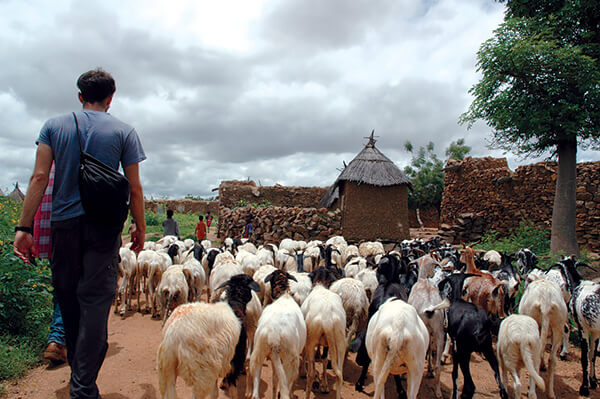 |
A herd of sheep gather outside Dogon village, Mali.
Photo by Jason Motlagh. |
Visas
Visas should be arranged in one’s home country as African bureaucracy is notoriously slow. In general, they cost between $20-$50 and can usually be renewed for a reasonable fee in-country near expiration. Personal
safety should not be an overwhelming concern if one exercises common sense and does sufficient pre-trip research. However, trouble can appear without warning; the BBC World Service on shortwave radio (or via the web, if you have access) is indispensable for keeping abreast of breaking developments. The U.S. State Department provides travel advisories and country reports with links to register online at U.S. embassies across the region.
Take Time for Travel
West Africa is easily accessed via direct flights from New York and mainland Europe. Most travelers fly into Dakar, Senegal or Accra, Ghana — hub destinations where tickets tend to be cheaper and the transition
is not overly jarring. Still, overland travel is the best and often the only way of travel within the region; consider getting a desert primer by flying into Morocco and heading south along the trans-Sahara Atlantic route through the Western Sahara territory and otherworldly Mauritania en route to Dakar. Time is the essential ingredient for any West African journey, and it would be futile to map out a strict itinerary. Better to immerse oneself in one or two
countries if time is limited. To make a meandering overland trip from Dakar to Accra, for example, set aside at least four solid weeks.
Throughout West Africa, buses, sport utility vehicles, and workhorse Peugeot 505 bush taxis ply off-track or what’s left of tarmac roads. Get used to some good natured haggling over fares and pushing for what
space is available; 6-passenger vehicles are routinely stuffed with two to three times that amount in addition to goods or animals that may be stored on top (of you sometimes). River travel is also a must along the Niger, the life-giving artery
of the region, where affordable pinasse boats can take one from Bamako, Mali, to the bustling port of Mopti, and on to Timbuktu. When it’s working, the Dakar-Bamako rail line is another option, but beware of thieves on board.
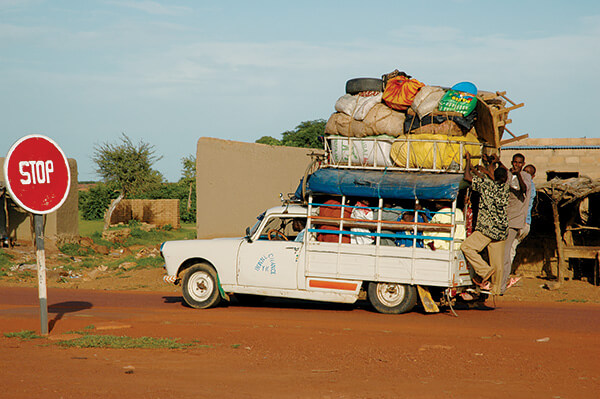 |
Peugeot taxi buckles under standard excess of passengers and cargo outside Djenne, Mali.
Photo by Jason Motlagh. |
The hottest months are April through September, when a relentless sun pounds down like a fist. Temperatures in the Sahara can exceed 120 degrees and stay well above 100 throughout much of the Sahel — the semi-arid
band of savannah at the bottom of the desert that stretches from Mauritania to Chad. November through January is the ideal time to travel.
Whatever the traveler’s destination, the West African people will steal the show along the way. Those in the direst of straits often extend extraordinary hospitality — and open invitations to come back again.
Westerners are de facto ambassadors from their countries of origin. In some instances they may be the only contact far-flung locals have with an American or Canadian national. As they gain a more nuanced understanding
of the region’s complexity, travelers are likewise poised to melt away crude perceptions — rooted in politics and pop culture — of Western indifference.
For More Info
What to Bring
- Light-colored, breathable pants and long-sleeve shirt
- A couple of T-shirts
- Boots, sandals, and flip-flops
- Hat and sunglasses
- Waterproof jacket for rainy season
- Basic medical kit with water purification pills
- Mosquito net and spray
- Small Swiss army knife
- Pocket calculator
- Hidden money belt
- Duct tape
- Padlock
- Camera
- Short-wave radio with batteries.
Websites
BBC: Africa
AllAfrica.com
Thompson Reuters Foundation |
Jason Motlagh is a Washington, D.C.-based editor at United Press International but a freelancer at heart. He has reported from West Africa, Asia, and the Caribbean for various U.S. and European news media.
|
